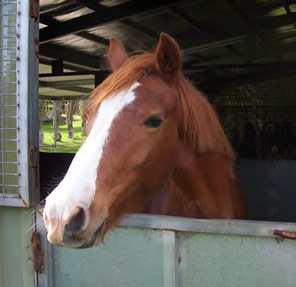Over the stable door
Greetings Fellow Equines and Horse Owners!
Getting into summer again and we all need to be thinking about our fire plans. Apart from the obvious plans for house and self, there are our animals to consider. Cats and dogs can be easily catered for when planned ahead, but make sure that if they tend to be flighty that you may need to have a special cat or dog cage.
With our equines it can be a much more complicated matter.
Planning ahead is probably the most important aspect. Let’s assume that the paddocks all have clear fence lines, shedding is well cleared and you have a clear escape outlet if you plan to go. If you do plan on leaving, then keeping your property as fire retardant as possible is going to make the job so much easier and safer for the guys in the CFS. Of course this also applies if you plan on staying! Keeping horses’ tails shorter will minimise risk of burns; do not leave halters or any other head gear on your horses and especially not any rugs. Keep gates open so they can run. Some of the worst injuries apart from burns are those horses who have been caught in fences and gates. Make sure you have a record of your horse’s brands and any other distinguishing characteristics. Include their age, sex, breed, height, colour, name and any other pertinent information. As well as your own first aid kit, keep a fully stocked one for your horse as well (including at least 2 vet contact numbers). Make sure you check this early on in the season in case you have to add anything. Ensure your fire pumps are in working order. Even if they were working at the end of last season, test them again! Check all water points to make sure they are in working order too.
Keeping up to date with the latest fire news is essential. Be really sure about whether you are staying or going.
If you are going, then sooner is better than later. Have a safe venue to go to and have that organised in advance. In your float or vehicle it may be useful to carry spare water, extra feed and bins (the place you are going may have limited supply), your veterinary equipment and any other gear you usually keep for your horse. If you don’t have a float and plan to leave, organise ahead to borrow a float or go with someone else. Also be sure that your horse will actually go onto a float. This won’t be the best time in the world to commence your float training!
Keeping in communication with your neighbours is useful too.
You may be at work and need to come home quickly. A friendly neighbour can be truly helpful here. In fact, a network of contact details of your immediate neighbours can be useful. Knowing whether you all plan to stay, or go, is a good preparation in case of an emergency situation. Hopefully this never arises, but if it does, you will so much better prepared!
Good luck this summer everyone and safe riding,
Hamish.

